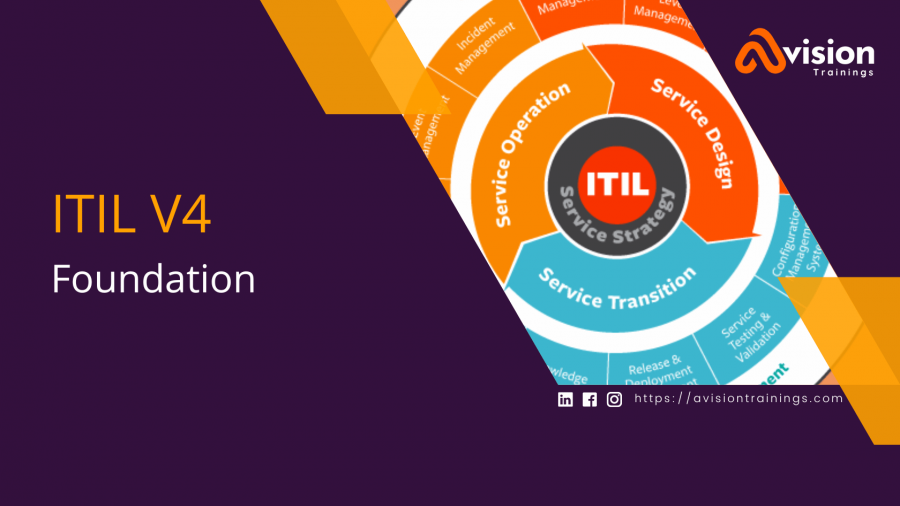ITIL V4 Training Course in Lahore, Pakistan | ITIL V4 Certification | ITIL V4 Training Institute - Avision Trainings
ITIL v4 Course
ITIL v4 is the latest version of the IT Infrastructure Library (ITIL) framework, a set of best practices and processes for IT service management. ITIL v4 builds on the previous versions of the framework and introduces new concepts, such as the service value system and the ITIL practitioner role, to provide organizations with a more holistic approach to service management. ITIL v4 provides organizations with a comprehensive framework for managing IT services. By implementing ITIL practices and processes, organizations can improve their service delivery, increase customer satisfaction, and optimize their IT service management activities. With a range of ITIL certifications available, individuals can also demonstrate their expertise and enhance their career prospects in the IT service management field.
In this guide, we'll explore the key components of ITIL v4 and how they can help organizations improve their IT service management practices.
ITIL v4 Course Outline
Introduction to ITIL v4:
- Overview of ITIL (Information Technology Infrastructure Library) framework.
- Evolution from ITIL v3 to ITIL v4 and key changes.
- Importance of ITIL in modern IT service management.
Module 1: Introduction to Service Management with ITIL v4:
- Understanding the fundamentals of service management.
- Overview of ITIL v4 service value system (SVS).
- Key concepts, principles, and components of ITIL v4.
Module 2: Service Value Chain (SVC):
- Exploring the service value chain and its components.
- Understanding the activities and interconnections within the SVC.
- Identifying opportunities for value creation and optimization.
Module 3: ITIL v4 Service Lifecycle:
- Overview of the ITIL v4 service lifecycle stages:
- Service Strategy
- Service Design
- Service Transition
- Service Operation
- Continual Service Improvement (CSI)
- Understanding the objectives, processes, and activities within each stage.
Module 4: Service Management Practices:
- Introduction to ITIL v4 service management practices (SMPs).
- Detailed exploration of SMPs including:
- Incident Management
- Problem Management
- Change Control
- Service Request Management
- Service Desk
- Service Level Management
- IT Asset Management
- And more...
Module 5: ITIL v4 Guiding Principles:
- Understanding the seven guiding principles of ITIL v4:
- Focus on Value
- Start Where You Are
- Progress Iteratively with Feedback
- Collaborate and Promote Visibility
- Think and Work Holistically
- Keep it Simple and Practical
- Optimize and Automate
- Applying guiding principles to improve service management practices.
Module 6: ITIL v4 Practices for Continual Improvement:
- Overview of the Continual Improvement (CI) model in ITIL v4.
- Implementing the Plan-Do-Check-Act (PDCA) cycle for continual improvement.
- Identifying opportunities for improvement and measuring success.
Module 7: ITIL v4 Certification Paths:
- Understanding the ITIL v4 certification scheme and levels.
- Overview of ITIL Foundation, Practitioner, and Managing Professional certifications.
- Exam preparation tips and resources for ITIL v4 certification exams.
Module 8: ITIL v4 Implementation and Adoption:
- Strategies for implementing ITIL v4 practices within an organization.
- Overcoming common challenges and barriers to adoption.
- Best practices for driving cultural change and fostering a service-oriented mindset.
Module 9: Case Studies and Practical Applications:
- Real-world case studies demonstrating successful implementation of ITIL v4 practices.
- Practical exercises and scenarios to apply ITIL v4 concepts in various organizational contexts.
- Lessons learned and insights from organizations that have embraced ITIL v4.
Module 10: Future Trends and Evolving Practices:
- Exploring emerging trends and developments in IT service management.
- Predictions for the future of ITIL v4 and its impact on the industry.
- Strategies for staying updated and adapting to changing technology landscapes.
The Service Value System (SVS):
The Service Value System is a new concept introduced in ITIL v4, which provides organizations with a comprehensive view of their IT service management activities. It consists of six components:
- The Service Value Chain - a series of interconnected activities that create value for the customer.
- Guiding Principles - a set of recommendations that guide organizations in making decisions and taking actions.
- Governance - a framework for decision-making and accountability.
- Service Management Practices - a set of best practices for managing IT services.
- Continual Improvement - a process for improving IT service management practices over time.
- The ITIL Practitioner Role - a new role in ITIL v4 that focuses on the practical application of ITIL practices.
The ITIL Service Lifecycle:
The ITIL Service Lifecycle is a framework for managing IT services from conception to retirement. It consists of five stages:
- Service Strategy - the stage where the organization defines its service offerings and develops a strategy to meet the customer's needs.
- Service Design - the stage where the organization designs the services to be offered, including processes, policies, and procedures.
- Service Transition - the stage where the organization prepares for the launch of the new or modified service.
- Service Operation - the stage where the organization delivers the service and manages its day-to-day operation.
- Continual Service Improvement - the stage where the organization evaluates the service and looks for ways to improve it over time.
ITIL Processes:
ITIL v4 defines a set of ITIL processes that are essential for effective IT service management. These processes include:
- Change Management - the process for managing changes to IT services and infrastructure.
- Incident Management - the process for restoring normal service operation as quickly as possible.
- Problem Management - the process for identifying and resolving underlying causes of incidents.
- Service Level Management - the process for negotiating, documenting, and monitoring service levels.
- Capacity Management - the process for ensuring that IT services have adequate capacity to meet customer demand.
- Availability Management - the process for ensuring that IT services are available when needed.
- Service Continuity Management - the process for ensuring that IT services can be recovered in the event of a disaster.
ITIL Certification:
ITIL v4 offers a range of certifications for individuals who want to demonstrate their expertise in IT service management. These certifications range from the ITIL Foundation, which provides an introduction to the ITIL framework, to the ITIL Master, which is the highest level of certification and demonstrates mastery of ITIL practices and principles.
Why is ITIL V4 training important?
ITIL V4 training is important because it provides professionals with the knowledge and skills they need to manage IT services effectively. The training covers a wide range of topics, including service management, service value system, service value chain, and guiding principles. It also provides guidance on how to apply ITIL V4 concepts to real-world scenarios.
Here are some of the benefits of ITIL V4 training:
-
Improved efficiency and effectiveness: ITIL V4 training helps professionals understand the best practices for managing IT services. By applying these practices, organizations can improve their efficiency and effectiveness in delivering services to customers.
-
Better customer satisfaction: ITIL V4 training focuses on delivering value to customers. By applying ITIL V4 concepts, organizations can better understand their customers' needs and deliver services that meet or exceed their expectations.
-
Increased agility: ITIL V4 training provides guidance on how to adapt to changing business needs. This enables organizations to be more agile and responsive to market demands.
-
Better collaboration: ITIL V4 training emphasizes the importance of collaboration between different teams and departments within an organization. By working together, organizations can deliver better services to customers.
-
Career advancement: ITIL V4 training is highly valued in the IT industry. By obtaining ITIL V4 certification, professionals can demonstrate their expertise in IT service management and increase their career prospects.
ITIL V4 Training Course in Lahore, Pakistan:
Avision Trainings offering ITIL V4 training course, essential for professionals in the IT industry who want to improve their knowledge and skills in IT service management. It provides guidance on best practices for managing IT services, delivering value to customers, adapting to changing business needs, and collaborating effectively within an organization. By obtaining ITIL V4 certification, professionals can demonstrate their expertise and increase their career prospects.
How do I become ITIL v4 Certified?
To become ITIL V4 certified, you need to follow these steps:
-
Choose an ITIL V4 certification level: There are four certification levels in ITIL V4 - Foundation, Managing Professional, Strategic Leader, and Master. Choose the level that aligns with your career goals.
-
Enroll in an ITIL V4 training course: You can enroll in a training course offered by an accredited training organization. The course will cover the ITIL V4 framework, best practices, and practical applications.
-
Study and prepare for the exam: Once you have completed the training course, you need to study the ITIL V4 materials and practice exam questions. This will help you prepare for the certification exam.
-
Take the certification exam: You can take the ITIL V4 certification exam at an accredited testing center or online. The exam consists of multiple-choice questions, and you need to achieve a passing score to obtain certification.
-
Obtain your ITIL V4 certification: After passing the certification exam, you will receive a certificate that verifies your ITIL V4 certification.
It's important to note that ITIL V4 certification requires renewal every three years to maintain your certification status. You can do this by obtaining Continuing Professional Development (CPD) credits, which involves staying up-to-date with ITIL V4 best practices and attending relevant training courses or conferences.
Submit Reviews

Rs: 40,000
- Level:Beginner to Professional
- Class Timings:8:00-9:30pm
- Duration:2 Months
- Days:Mon-Tu-Wed
- Lifetime Support
- Free Trial Session






























